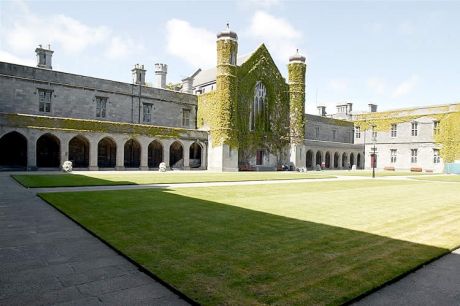Anglo Irish Bank’s trial told directors knew about their illegal scheme


The three former directors of Anglo Irish Bank pictured above, Seán FitzPatrick,William McAteer and Pat Whelan,
PROSECUTION SAYS FITZPATRICK DID NOTHING TO STOP BANK SHARES MOVE
Three former Anglo Irish Bank directors were aware of a “choreographed” and “absolutely illegal” scheme to fund the buying of shares in the bank, the jury was told on the opening day of the bankers’ trial yesterday.
Seán FitzPatrick (65), William McAteer (63) and Pat Whelan (51) are accused of providing unlawful financial assistance to members of businessman Seán Quinn’s family and the so-called Maple 10, a trusted group of Anglo borrowers, to buy shares in Anglo in July 2008.
The prosecution says the transaction was designed to create the public perception of stability in the bank’s share price.
Before a jury of eight women and seven men, prosecution counsel Paul O’Higgins said it was the State’s case that Mr Whelan, who was the bank’s managing director for lending in Ireland, was “very much involved” in the transaction, while Mr McAteer, then finance director, was not as involved but “knew all about them”.
The prosecution alleges that Mr FitzPatrick, as non-executive chairman, was told about the lending and did nothing to stop it. Mr O’Higgins told the jury Anglo issued loans totalling almost €625 million to 16 people comprising members of businessman Mr Quinn’s family and 10 trusted customers of the bank.
Overflow room
Almost 150 people were in court for the first day of the trial, which is being transmitted via video-link to an overflow room elsewhere in the Criminal Courts of Justice building in Dublin. The three defendants spoke only once to enter not guilty pleas. Mr FitzPatrick and Mr Whelan admit the money was lent for the purpose of buying shares in the bank. But counsel for Mr Whelan, Brendan Grehan SC, said the lending was “in the ordinary course of business” and both the Irish and British financial regulators had agreed to it.
Dublin Circuit Criminal Court heard that section 60 of the 1963 Companies Act allows for a defence of such activity if lending is “in the ordinary course” of the company’s business.
The prosecution say the scale and nature of the loans show they were not given “in the ordinary course of business”. Opening the prosecution case, Mr O’Higgins said that in 2007, senior staff at Anglo discovered Mr Quinn controlled about 25 per cent of the bank through “contracts for difference” (CFDs), a financial instrument counsel described as “an extraordinary form of gambling”. “We’re not talking about thousands here, or millions, we’re talking about tens of millions, maybe hundreds of millions,” Mr O’Higgins said.
Anglo was “not keen” that it was so exposed to one person. The bank made a series of “efforts” to deal with Mr Quinn’s position. By February 2008, “at least”, counsel said, the financial regulator also knew about Mr Quinn’s position and was “very concerned”. Anglo tried to unwind Mr Quinn’s position by inviting Middle Eastern investors to buy the stocks but its efforts were unsuccessful.
SITUATION WORSENED
On March 17th, 2008, the situation worsened when the collapse of Bear Stearns Bank caused Anglo’s share price to drop. From a peak of €17.00 in 2007, the share price was now down to €6.50.
Mr O’Higgins said sometime in July, 2008, Anglo “decided to do something absolutely illegal.”
Mr FitzPatrick, Greystones, Co Wicklow, Mr McAteer, Rathgar, Dublin, and Pat Whelan Malahide, Co Dublin, have pleaded not guilty to all charges.
Judge Rosemary Watters regrets her ‘drinking game’ reference’s
A Northern Ireland judge who was filmed at a family event drinking a shot and saying “neck and nominate” has said she recognises her “foolish behaviour”.
NekNomination is a game in which people are encouraged to drink alcohol in one go before posting a video online.
The Lord Chief Justice’s Office, issued a statement, saying: “The video was taken at a family event.”
It added: “Judge Watters recognises her foolish behaviour and would discourage anyone else from repeating what she did.”
The concept of the game has been described as ‘neck your drink, nominate another’ person to do the same within 24 hours.
They post a video of themselves completing the challenge and nominate two of their friends to do the same.
“Neknominees” who refuse and break the chain are subject to online ridicule.
On Monday, a Northern Ireland-based Facebook page sharing videos of the drinking game was discontinued after the death of an Irish teenager.
Jonny Byrne, who was 19 and from County Carlow, died after jumping into the River Barrow in Carlow on Saturday.
His family said he had been playing ‘NekNomination and believe the craze has turned into a form of bullying.
Jonny Byrne entered the River Barrow on Saturday night and after hours of searching, his body was recovered shortly after 11:00 GMT on Sunday.
The teenager’s father, Joe Byrne, told Irish state broadcaster RTÉ: “I’m pleading to every youngster to think of the things they’re doing.
“It has cost my son his life. The whole family is devastated and our lives will never be the same again.”
New stem cell facility license for NUIG Galway to test for human therapies


The Centre for Cell Manufacturing Ireland at NUI Galway, the first facility of its kind on the island of Ireland, has received a licence from the Irish Medicines Board (IMB) to manufacture culture-expanded stem cells for human use.
There are many human diseases which have either inadequate or no effective treatments, and since 2004 researchers based at the Regenerative Medicine Institute (REMEDI) in NUI Galway have been working to develop new therapies.
Now it has been successfully accredited, the Centre for Cell Manufacturing Ireland plans to supply stem cells for use in clinical trials following regulatory approval arising from pre-clinical data generated at REMEDI.
The first clinical trial using CCMI-manufactured stem cells is being funded by the Health Research Board and Science Foundation Ireland. It will investigate the safety of using mesenchymal stem cells (MSCs) isolated from bone marrow for the treatment of critical limb ischaemia, a common complication associated with diabetes and which can often result in limb amputation. MSCs must be grown in the laboratory to generate sufficient quantities following their isolation from the bone marrow of adult donors.
Stem cell technology is being developed in the first instance to help patients with diseases such as diabetes, arthritis, heart disease and critical limb ischaemia.
Speaking at the Centre’s launch, Prof Tim O’Brien, Director of the Centre for Cell Manufacturing Ireland, said: “The presence of this facility will allow us to translate discoveries from the basic stem cell research programme led by Prof Frank Barry at the Science Foundation Ireland-funded REMEDI, to the clinic.”
MEANWHILE:
Scientists turn stem cells into liver and pancreas precursor cells

Scientists in Singapore have developed a novel method of directing human stem cells into a valuable cell type that gives rise to organs including the liver and pancreas.
This cell type, known as endoderm, is highly sought-after for therapeutic and biotechnological purposes. However, highly pure populations of endoderm have been historically difficult to attain from human pluripotent stem cells (hPSCs).
hPSCs are stem cells that can generate over 200 distinct cell types in the human body. They respond to multiple external protein instructions to differentiate into other cell types. Therefore, generating one single cell type from hPSCs, and a pure population of that given cell type, is delicate as hPSCs have a tendency to also form other types of cells.
In their paper, published in Cell Stem Cell, the researchers employed a systematic and novel approach in screening for proteins and chemicals that promote the formation of the desired cell type, and concurrently block induction of unwanted cell types. This strategy uncovered a combination of triggers that could drive hPSCs towards pure populations of endoderm.
According to the researchers, the valuable cells produced and the insights gained from this work have brought stem cells one step closer to clinical translation and furthered basic research into the understanding of how cell fates are specified during stem cell differentiation.
“This unprecedented access to highly pure population of endodermal cells attracts pharmaceutical companies, who are interested in further making human liver cells to tests drug toxicities,” said Dr Bing Lim, who led the study.
The team also characterized the transcriptional and enhancer states of these highly pure cells. Enhancers are DNA elements that can become activated to increase the expression of flanking genes. In hPSCs, a category of dormant enhancers was reported to be pre-configured before subsequently becoming activated when the cells differentiate.
Yahoo moves website services to an Irish hub

Yahoo chief executive Marissa Mayer.
Mail, Flickr and other services will now be subject to Irish data protection laws
Yahoo’s Irish hub has begun to take on responsibility for providing some of the company’s major services, as part of the expansion announced last year.
Customers were being contacted this week to inform them of the move, which will see services for Yahoo’s Mail, Messenger, Answers, Maps, Ad Free Mail, Mail Plus, Toolbar and Flickr service provided by Yahoo’s European, Middle East and Africa operation, which is based in Ireland.
That means the services will now be provided under Irish law and subject to data protection regulations here, with the Dublin office replacing other offices as the data controller responsible for handling personal information for the affected services.
The move is part of Yahoo’s decision last year to expand its Irish operation, adding 200 jobs across customer support, technology, operations, HR and finance to support Yahoo’s business in the region. The company currently employs more than 270 people here.
Some of the services are currently under the responsibility of Yahoo UK and other European offices. However, the change, which will come into effect from March 21st, will have the biggest impact on the company’s offices in Switzerland and Cairo, a spokeswoman for Yahoo said. Those offices are believed to be closing, although other European locations will remain unaffected by staff cuts.
“We’ve been trying to bring as many Yahoos together in the one place as possible,” the company’s spokeswoman said.
In a statement posted on its blog, Yahoo said the decision was driven by business needs and a desire to encourage more collaboration and innovation.
“Dublin is already the European home to many of the world’s leading global technology brands and has been a home for Yahoo for over a decade already,” the company said in a statement. “In line with the expansion of Yahoo’s Irish operations, it is the right time for the business to change the terms of service so that they are with Yahoo EMEA.”
The crunch time & most likely time to ruin your diet plans is at 4.12pm


Dieters are most likely to crave for unhealthy food in the afternoon about 4:12pm,
ACCORDING TO PA RESEARCH
As people try to stick to a healthy start to 2014, it is 4.12pm when they should most be on their guard, according to research.
The study, carried out for soft fruit campaign Seasonal Berries, found that people are most likely to crave unhealthy food in the afternoon – with the most popular time to be at 4.12pm.
 Just under half of Britons (45%) said afternoon snacking was the main reason they broke their new year diets, while 35% succumbed to the daily afternoon hunger slump, with crisps, biscuits and chocolate named as the biggest downfalls.
Just under half of Britons (45%) said afternoon snacking was the main reason they broke their new year diets, while 35% succumbed to the daily afternoon hunger slump, with crisps, biscuits and chocolate named as the biggest downfalls.
The research, conducted by OnePoll for Seasonal Berries, questioned 1,000 men and women in January about their diet failures.
According to the poll, more than half of those questioned (59%) said other people often contributed to their diet failures – more than a third (37%) blamed their partner, while 11% said colleagues forced unhealthy snacks on them.
Just over a quarter (27%) said a lack of flavour in their diet made it harder to eat healthily, while 36% blamed it on seeing other people eat what they want.
 The research also suggested that men have more willpower when it comes to diets, with 69% sticking to their healthy eating plan one month on, compared with 63% of women.
The research also suggested that men have more willpower when it comes to diets, with 69% sticking to their healthy eating plan one month on, compared with 63% of women.
It also showed that on average people break their diet five times, with most diets ending at the nine-day mark.
The time most people were likely to break their diet was calculated by asking the 1,000 respondents when they were most likely to snack during the day.
Time ranges were given for people to select between 4pm and 11pm, then the average number was calculated by taking the midpoint of the ranges and the number of people that selected each time range.
Nutritionist Dora Walsh, founder of Nutriheal Nutrition Clinics, said: “Sticking to a diet for some people can be tricky, and understanding that 4.12pm is the time people crave sweet and unhealthy snacks means that you should be prepared for this so you don’t ruin a diet plan.
“At this point in the day, blood sugar can be low and cause you to crave sweet treats but doing things like eating little and often throughout the day and having pre-prepared snacks can help.
“Snacking on fruits like berries is easy as they are very versatile and also easy to snack on. Berries are tasty, easy to eat and will curb those hunger pangs and get you through the afternoon without breaking your diet or feeling guilty.
“They are very low in sugar and calories and are highly nutritious – just one cup of berries counts as one of your five a day. Their health benefits are numerous and diverse so I always advise my clients to eat berries to curb their hunger pangs, keep the weight off and maximize their health.”
The research comes after England-wide data this week revealed that three-quarters of people in some parts of the country are overweight or obese.
A spokeswoman for Seasonal Berries, which is funded by British Summer Fruits, said: “Eating healthily shouldn’t feel like a chore and it is possible to make healthy dishes taste great.
“Berries are very versatile and can be incorporated into recipes or eaten alone as a snack. They are also naturally sweet so they will also help with food cravings in the afternoon.”
Irish researchers make significant breakthrough in semiconductor production

Mahdi Shirazi with team leader, Dr Simon Elliot on the left.
Irish researchers make a significant breakthrough in semiconductor production.
A team from the Tyndall National Institute in Cork has produced the world’s first atom-by-atom simulation of nanoscale film which could revolutionise silicon chip production.
Using a technique known as atomic layer disposition (ALD), the team led by Dr Simon Elliot created the simulation of the thin-film technology that is used in nearly every device that we own today and each chip comprises multiples of these layers, each providing different functions.
Once the team’s simulation is a physical reality, silicon chips can become even smaller and more powerful, as well as other technologies like solar cells and LED lighting.
For the first time, the Irish team combined the accuracy from the quantum mechanical level with the statistics needed to follow how thousands of atoms react millions of times a second, building up layers of material, as in the lab.
The success of this work can be laid firmly in the hands of one team member, Mahdi Shirazi, who will soon be awarded a PhD for his work with the project.
He believes this discovery and simulation was a necessary step for the development of ALD silicon chips: “It was crucial to model the complete set of all ALD reactions, hundreds of them, at the quantum mechanical level and then carefully extract the information that was needed for the growth simulations.”


No comments:
Post a Comment